UNIVERSAL CITY (California) • Eleven years after parting ways, seemingly forever, the Will & Grace gang - same cast, same writers, same studio audience warm-up guy - reunited on the NBCUniversal lot here in mid-August.
As they started work on 29 new episodes, Sean Hayes, returning to his role as the overly dramatic Jack, belted out a song from Dreamgirls. Megan Mullally, who plays Karen, did a little dance and shouted: "Sass is in the house!"
But not everyone was doing Rockette kicks. Ruminating on a sofa in the middle of Stage 22 were Max Mutchnick and David Kohan, the creators of Will & Grace. They were fretting about the evolved culture, in particular the emphasis on identity politics and the way television shows are now picked apart on social media. How would their sometimes sharp-edged sitcom, which returns to NBC on Sept 28, go over in the Age of Rage?
"That really is the big question," Mutchnick said.
Will & Grace pushed well past the broadcast network comfort zone when it arrived in 1998. The show's framework was familiar - I Love Lucy (1951-1957), with twists - but its focus on gay characters was not.
Now, however, the question is not whether the series is too inclusive, but whether it is inclusive enough.
It is about four privileged white people. The characters, in particular the politically incorrect Karen, occasionally crack racially tinged jokes. Although the lovably uptight gay character at the centre of the show, Will, played by Eric McCormack, is best friends with Grace, played by Debra Messing, he sometimes makes quips that could come across as misogynistic in today's climate.
In rehearsal for the third episode, writers had Will joking: "It's all in the book Men Are From Mars, Who Cares Where Women Come From."
"I would imagine that there will probably be a bit more blowback," Kohan said of the show's politically incorrect humour. "But saying the most un-PC things has always been part of what makes the show funny, so I'm hoping we get away with it."
NBC sees the revival as comfort food that viewers will gobble whole. At a time of political upheaval and civil unrest, liberal network programmers are betting that the masses are wistful for the Bill Clinton 1990s. The nostalgia boom includes Fuller House on Netflix and a new incarnation of Law & Order on NBC.
The revived Will & Grace is not totally caught in a time warp. New episodes take place in the present day - Karen is now besties with United States First Lady Melania Trump.
Among other changes, Rosario, Karen's long-suffering maid, has been written off the show. Messing asked that tweaks be made to Grace. "I wanted her to have a noticeable feminist strain," she said. "The real world is a scary, divisive place right now, especially for women, whose rights are being attacked and autonomy challenged."
Karen has not changed for the better, though. "And I can't tell you how fun that is," Mullally said. "I'll play Karen until I die if they let me."
NYTIMES

